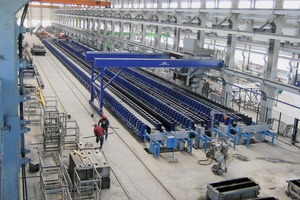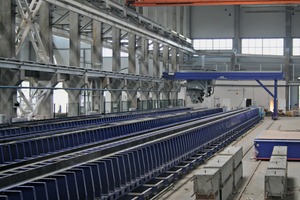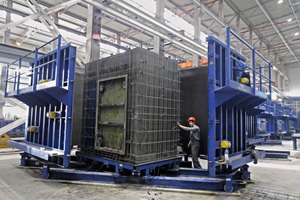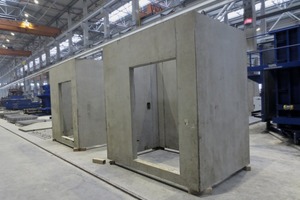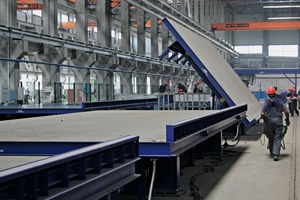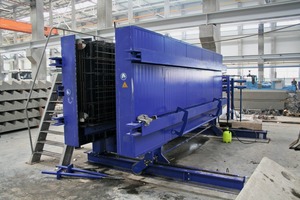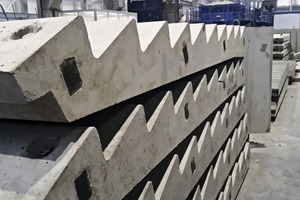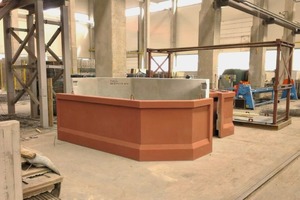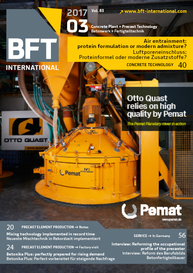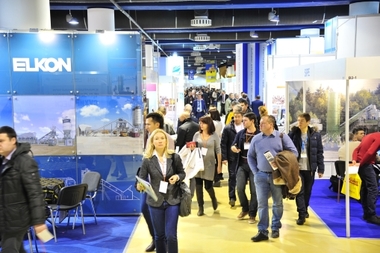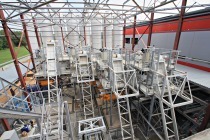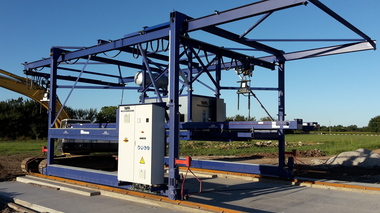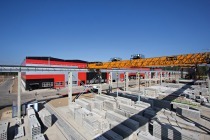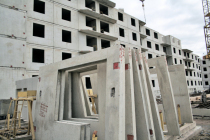Prefabricated concrete plant DSK Grad expanded by stationary production
The Russian construction group Morton just built the new, huge prefabricated concrete plant DSK Grad near Moscow. With Weckenmann Anlagentechnik GmbH & Co. KG, Dormettingen, a specialist was brought on board that took over all the tasks involved in the second part of the construction project, from the implementation of stationary production, project coordination and transportation to assembly.
The new prefabricated concrete plant DSK Grad belongs to the Russian construction and real estate group Morton. Founded in 1994 as a construction company, the Moscow company branched out into real estate in 1997. Morton is now one of the top ten companies in its branch. The new production facility DSK Grad of the construction group has some impressive numbers. However, this is not really surprising, after all, they set ambitious goals for themselves: The annual capacity of the prefabricated components produced there is about 525,000 m².
The new plant was built in the open country-side in the south-west before the gates of Moscow. It comprises a huge hall complex and a storage area just as large. The circulation systems in use there for the production of wall elements are the subject of other reports. However, the stationary production with which Morton produces concrete components, among others for multi-storey residential buildings, is impressive. The company tendered this division of DSK Grad separately. Weckenmann participated in the tender and was awarded the contract to completely furnish two bays with dimensions of 192 x 20 m each.
Equipment included three powerful indoor cranes, which operate a great variety of casings. A bucket conveyor supplies a bridge crane concrete spreader, whose discharge container has a Hoist and slewing gear unit. This is necessary so that the system can satisfy the various concreting tasks, since depending on the order, the discharge varies between planar, linear or point by point. The spiked roller/slider concept of the new production is characterized in turn by simple operation, little wear and tear and sensitive dispensing. Transport of the finished precast concrete components from the hall to the warehouse is on a rail-mounted, radio controlled heavy goods vehicle. Distinctive feature: No power cable, it is driven by a gas generator.
Bandwidth at supplementary components
With the help of stationary production at DSK Grad a variety of prefabricated concrete parts are developed which complement or support the “classic four walls” of residential building. For example, the manufacture uses the three hydraulic, 75 m long twin beam molds from Weckenmann for manufacturing supports with and without consoles as well as prestressed girders and beams. So that the consoles can actually be molded in the desired places, the base and side parts of the formwork are designed as individual, interchangeable steel walls. The bottom formwork is height adjustable in increments of 50 mm. The side formwork has a stroke of 350 mm, so that cross-sections of 250 x 300 mm to 400 x 600 mm can be produced. Thanks to the adjustment hydraulics the opening and closing of the formwork is child’s play. Moreover it is dimensioned such that, it can receive the concrete pressure without additional mechanical locking.
The twin formwork is equipped with high frequency vibrators that are feed via two central frequency converters. Both can be operated by radio remote control. In addition, the formwork is built on prestressing beds, in order to be able to accommodate the tensioning force of a maximum of 6,120 kN per form. Fixed heating pipes supplied with hot water heat the construction from below. A tarpaulin keeps the heat in the system, which is equipped with a heating control system, which in turn regulates the temperature profile and heating time fully automatically.
Durable connections
Elevators and stairs connect the floors of the new construction. The elevators for personal transport have a shaft size of 2980 x 1970 x 1820 mm. The shafts for the freight elevators are 2980 x 1970 x 2920 mm. Due to the tremendous construction services of the company up to 15 elevator shafts leave production daily.
For this purpose, Weckenmann equipped the plant with capacity formwork made of steel. They consist of a hydraulically retractable inner core and two movable angular exterior walls. The recesses for the elevator door are magnetically fixed to a defined place. High frequency vibrators compact the concrete, which are controlled by radio and whose speed can be regulated incrementally from 0 to 6,000 rpm.
The formwork is equipped with a controllable hot water heating system, enabling 1.5 to dual allocation per day. For the upper and lower shaft elements that are shorter than the standard levels, an additional formwork bottom can be laid. The result: Premium quality monolithic, polymetric precast concrete components.
Foot traffic between floors takes place via ten-step standard stairs. They are 1,050 mm wide, have a gradient of 150 mm and a tread of 300 mm. For their production Weckenmann installed a 10-fold battery formwork in the DSK Grad plant. Integrated in the formwork are a hot water heating system and high frequency compaction technology. With the help of an additional individual formwork the precast concrete component manufacturer can also manufacture special stairs if necessary. Depending on the desired stair width, the formwork bottom is height adjustable between 0 and 1,800 mm. The maximum number of 14 steps can be reduced by reconnecting the vertical stopend formwork.
Architectural Variables
Balconies have become an integral part of modern residential construction, and Morton’s planners are also no exception to this rule. Therefore, precast concrete components produced in the DSK Grad plant also provide balcony parapets – not least also to achieve different architectural effects with form and surface. Thus, one of the tasks of the Weckenmann installation technicians consisted in the installation of two battery formwork, with which it was possible to simultaneously concrete ten different parapets with differing heights and widths. The parapet exteriors contain special structures that are achieved with the help of exchangeable mold/dies. As with the other new production formwork, hot water heating systems provide heat while high frequency vibrators compact. In addition, all movable formwork components are furnished with seals to prevent bleeding from the respective contact surfaces. The results are clearly defined, flawless edges.
Architectural effects can also be created with varying facade elements. The circulation system is used for wall and facade elements with standard dimensions. Four tilting tables with dimensions of 4.5 x 14 m and a bearing load of 750 kg/m² are available for all planar special elements in new production – likewise heatable and equipped with compaction technology. All of the tables have fixed, 200 mm high side railings; the other element sides are as a rule formed by magnet boxes and adapter fixed wooden formwork.
Everything from one source –
perfectly coordinated
The concept of stationary production, delivery and installation of the required formwork and system parts perfectly coordinated to the requirements of Morton or DSK Grad by Weckenmann Anlagentechnik GmbH & Co- KG represents only a portion of the tasks taken over by the precast concrete component specialists from Dormettingen for Morton. After completion of the construction work they are also available with advice and assistance for DSK Grad after start of production within the scope of the Weckenmann Service Package. This is also part of their quality promise.
In this way, the stationary production forms the logical expansion of the existing circulation systems in the new prefabricated concrete plant, DSK Grad. Thus, doubly well-equipped the construction firm can now tackle the goals it has set for itself and implement the planned large residential construction projects in Moscow.

